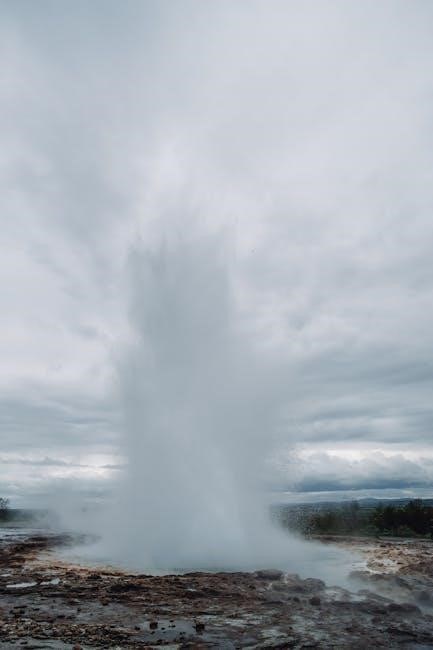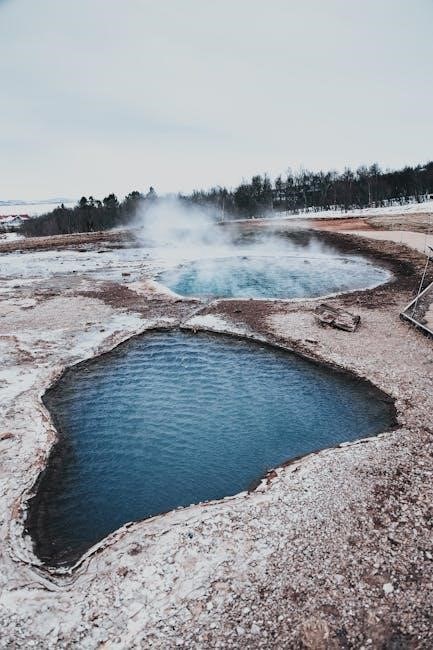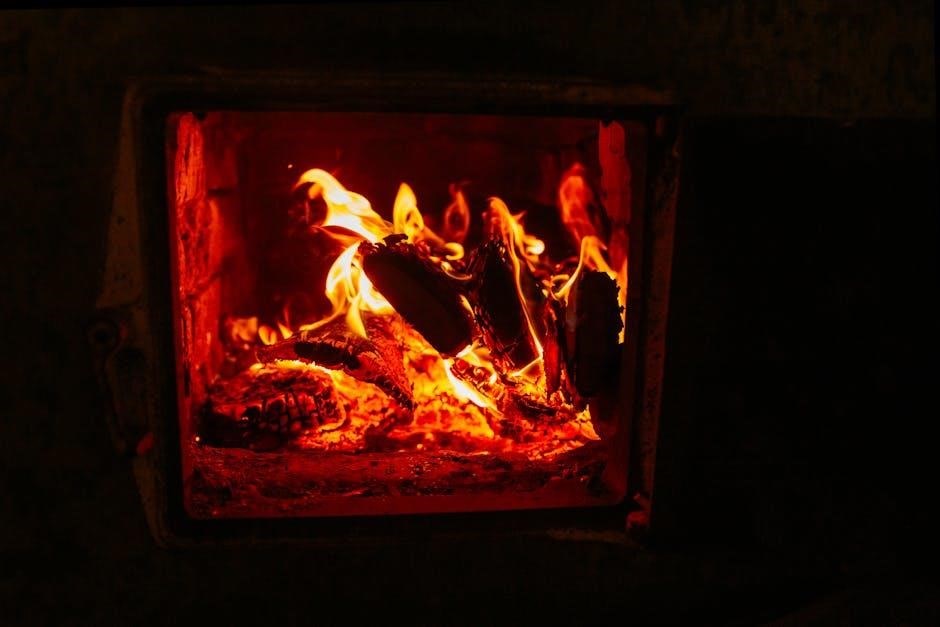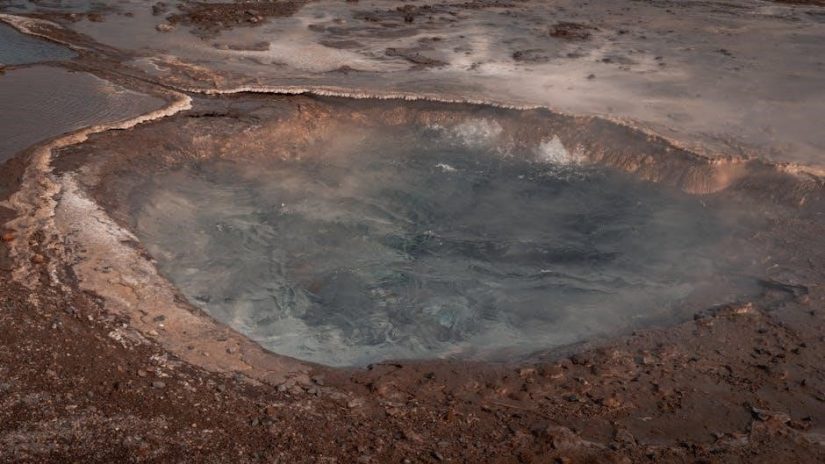An Energy Guide provides crucial information about a hot water heater’s efficiency and annual energy costs․ It displays the product’s Energy Factor (EF) or Uniform Energy Factor (UEF)‚ indicating how efficiently it converts energy into hot water․ The guide also highlights Energy Star certification‚ ensuring the product meets energy efficiency standards set by the U․S․ EPA‚ helping consumers make informed‚ eco-friendly choices․
An Energy Guide for hot water heaters provides essential information to help consumers understand a product’s energy efficiency and estimated annual operating costs․ It highlights key metrics like the Energy Factor (EF) or Uniform Energy Factor (UEF)‚ which measure how efficiently the heater converts energy into hot water․ Additionally‚ the guide indicates if the product meets Energy Star certification standards‚ offering insights into its environmental impact and potential cost savings․ This guide empowers homeowners to make informed decisions when selecting an energy-efficient hot water heater․
Understanding the Energy Guide Label
The Energy Guide label provides detailed insights into a hot water heater’s efficiency and energy consumption․ It displays metrics such as the Energy Factor (EF) or Uniform Energy Factor (UEF)‚ which measure how efficiently the heater converts energy into hot water․ The label also highlights whether the product is Energy Star certified‚ indicating it meets energy efficiency standards․ Additionally‚ it shows estimated annual energy costs and environmental impact‚ helping consumers evaluate long-term savings and sustainability․ This label is a vital tool for making informed purchasing decisions․
Types of Hot Water Heaters
Hot water heaters include tankless‚ storage tank‚ heat pump‚ and solar models․ Each type offers unique benefits‚ such as energy efficiency or continuous water supply‚ tailored to specific needs․
Tankless Water Heaters
Tankless water heaters provide hot water on demand without storing it‚ eliminating standby heat loss․ They are highly efficient‚ with some models offering up to 34% more efficiency than traditional storage tanks․ These heaters typically last 20 years and are ideal for spaces with limited room․ However‚ installation can be costly‚ and they may require upgrades to electrical or gas systems․ Energy Star-certified models offer significant long-term savings‚ making them a popular choice for eco-conscious homeowners․
Storage Tank Water Heaters
Storage tank water heaters store hot water in an insulated tank‚ providing a ready supply for household needs․ They are widely used due to their simplicity and lower upfront costs․ While less efficient than tankless models‚ modern designs with features like dual heating elements and advanced insulation improve energy performance․ Factors like tank size‚ insulation quality‚ and recovery rate influence their efficiency․ Regular maintenance‚ such as checking insulation and replacing anode rods‚ ensures optimal performance and extends lifespan‚ making them a practical choice for many homes․
Heat Pump Water Heaters
Heat pump water heaters use ambient air heat to warm water‚ offering high efficiency and lower energy costs․ They work best in mild climates and can be integrated with existing systems․ These heaters have a higher initial cost but provide long-term savings due to their energy efficiency․ With an Energy Factor (EF) of 2․0 or higher‚ they outperform traditional models․ They also reduce carbon emissions‚ making them an eco-friendly choice․ Ideal for homes seeking sustainable‚ cost-effective hot water solutions‚ heat pump water heaters are a forward-thinking option for energy-conscious users․
Solar Water Heaters
Solar water heaters harness sunlight to heat water‚ offering an eco-friendly and cost-effective solution․ They use rooftop solar panels to capture heat‚ which is transferred to a storage tank․ These systems are highly efficient in sunny climates and can significantly reduce energy bills․ Solar heaters often come with government incentives‚ making them a sustainable choice․ They require minimal maintenance and can integrate with traditional systems for backup heating․ Ideal for environmentally conscious homeowners‚ solar water heaters provide long-term savings and reduce reliance on fossil fuels‚ making them a green alternative for hot water needs․

Energy Efficiency Ratings
Energy efficiency ratings measure how well a water heater converts energy into hot water․ Higher Energy Factor (EF) or Uniform Energy Factor (UEF) values indicate better efficiency‚ lowering energy costs․
Energy Factor (EF)
The Energy Factor (EF) measures a water heater’s efficiency by calculating the ratio of hot water produced to the energy consumed․ Higher EF values indicate greater efficiency‚ reducing energy costs․ For example‚ electric water heaters often have higher EF ratings compared to gas models․ The EF is a key metric in the Energy Guide‚ helping consumers compare products and make informed decisions to save energy and lower utility bills over time․
Uniform Energy Factor (UEF)
The Uniform Energy Factor (UEF) is a standardized measure of a water heater’s efficiency‚ considering standby heat loss and operating conditions․ Unlike the Energy Factor (EF)‚ UEF provides a more comprehensive assessment‚ making it easier to compare different models․ Higher UEF ratings indicate better efficiency‚ especially in heat pump and tankless systems․ UEF is now the preferred metric for evaluating water heater efficiency‚ helping consumers identify models that offer long-term energy savings and environmental benefits․

Energy Star Certification
Energy Star certification is awarded to water heaters meeting strict EPA standards‚ ensuring high energy efficiency․ It helps reduce utility bills and environmental impact while promoting eco-friendly choices․
Benefits of Energy Star Certified Water Heaters
Energy Star certified water heaters offer significant advantages‚ including lower utility bills and reduced environmental impact․ These models meet strict EPA efficiency standards‚ ensuring superior performance․ By choosing an Energy Star certified heater‚ homeowners can enjoy long-term energy cost savings and contribute to a greener planet․ Additionally‚ many certified models qualify for rebates and incentives‚ further enhancing their value․ This certification is a reliable way to identify high-efficiency products that deliver both financial and environmental benefits over time․
Factors Influencing Energy Efficiency
Key factors affecting energy efficiency include insulation quality‚ heating element performance‚ and proper sizing to match household needs‚ ensuring optimal energy use and reduced waste․
Insulation Quality
High-quality insulation is essential for maintaining water temperature and reducing heat loss․ Advanced materials like foam or fiberglass minimize energy waste‚ ensuring the heater retains heat longer․ Better insulation leads to lower energy bills and reduced environmental impact by cutting overall energy consumption․ Look for models with superior insulation‚ such as HFO foam‚ to optimize efficiency and long-term cost savings․
Heating Elements
The type and quality of heating elements significantly impact a water heater’s efficiency and lifespan․ Dual heating elements‚ found in many electric models‚ offer faster water heating and better temperature control․ High-end materials like stainless steel or copper enhance durability and heat transfer efficiency․ Advanced heating elements also reduce energy consumption‚ contributing to lower utility bills and environmental impact while ensuring consistent hot water supply for household needs․
Size and Capacity
Choosing the right size and capacity for a hot water heater is crucial for meeting household needs while optimizing energy efficiency․ Tank capacity is measured in gallons‚ and recovery rate indicates how quickly the heater can replenish hot water․ A larger tank may offer more convenience but could increase energy costs․ Proper sizing ensures adequate hot water supply without excessive energy consumption‚ balancing comfort and efficiency․ Always consider household size and usage patterns to select the most appropriate model for your home․ Proper sizing prevents energy waste and enhances performance․
Comparing Tankless and Storage Tank Heaters
Tankless heaters offer higher efficiency and longer lifespan but may require significant installation costs․ Storage tank heaters are more affordable upfront but less energy-efficient long-term․
Pros and Cons of Tankless Water Heaters
Tankless water heaters offer high energy efficiency‚ longer lifespan (up to 20 years)‚ and space-saving design․ They provide continuous hot water and lower operating costs․ However‚ they have higher upfront costs‚ complex installation‚ and potential temperature fluctuations․ Flow rate limitations may require multiple units for large households․ Despite these‚ their benefits often outweigh drawbacks for many users seeking long-term savings and convenience․
Pros and Cons of Storage Tank Water Heaters
Storage tank water heaters are cost-effective and widely available․ They provide a large volume of hot water and are relatively simple to install․ However‚ they suffer from standby heat loss‚ reducing efficiency․ These heaters also require more space and have a shorter lifespan (10-15 years) compared to tankless models․ Despite these drawbacks‚ they remain a popular choice for their affordability and reliability‚ making them a practical option for many households seeking a traditional water heating solution․
Hybrid and Heat Pump Models
Hybrid and heat pump water heaters combine efficiency and innovation‚ using ambient heat to warm water‚ reducing energy consumption․ They offer eco-friendly‚ cost-effective solutions with continuous hot water supply․
How Hybrid Water Heaters Work
Hybrid water heaters‚ also known as heat pump water heaters‚ operate by transferring heat from the surrounding air to the water․ They use a refrigerant to absorb heat from the environment‚ which is then transferred to the water in the tank․ This process is highly efficient‚ especially in warmer climates‚ and can significantly reduce energy consumption compared to traditional electric water heaters․ Additionally‚ hybrid models often include electric backup elements for periods of high demand or colder temperatures‚ ensuring a reliable hot water supply while maintaining energy savings․
Advantages of Heat Pump Water Heaters
Heat pump water heaters offer exceptional energy efficiency‚ using up to 50% less energy than traditional electric models․ They extract heat from the surrounding air‚ reducing reliance on direct electric heating․ This results in lower utility bills and a smaller carbon footprint․ Additionally‚ many models qualify for Energy Star certification and federal or state rebates․ They also feature advanced controls‚ dual heating elements for backup‚ and robust insulation‚ ensuring consistent performance and long-term savings․ Their eco-friendly design makes them a sustainable choice for homeowners․

Installation and Maintenance
Proper installation by a licensed professional ensures safety and efficiency․ Regular maintenance‚ such as checking insulation‚ anode rods‚ and temperature settings‚ prevents issues and extends lifespan․
Best Practices for Installation
Ensuring proper installation is crucial for optimal performance and safety․ Start by selecting a qualified‚ licensed professional to handle the setup․ Always follow the manufacturer’s instructions precisely‚ paying attention to ventilation requirements for gas models․ Position the heater in a well-ventilated area‚ away from flammable materials․ For electric models‚ ensure the electrical system can handle the load․ Insulate exposed pipes to reduce heat loss․ Install a temperature-pressure relief valve to prevent excessive pressure buildup․ Finally‚ test the system thoroughly after installation to ensure everything functions correctly and efficiently․
Regular Maintenance for Optimal Efficiency
Regular maintenance is essential to maintain your water heater’s efficiency and longevity․ Annually inspect and replace the anode rod to prevent corrosion․ Check temperature and pressure relief valves to ensure they function properly․ Drain sediment from the tank to avoid buildup and reduce heating efficiency․ For tankless models‚ descale the heat exchanger regularly to remove mineral deposits․ Insulate exposed pipes to minimize heat loss․ Monitor energy consumption and adjust settings as needed․ Proper upkeep ensures consistent performance‚ saves energy‚ and extends the unit’s lifespan‚ preventing costly repairs․

Cost Savings and Environmental Impact
Energy-efficient hot water heaters reduce energy consumption‚ leading to lower utility bills and a smaller environmental footprint by minimizing carbon emissions and energy waste․
Long-Term Energy Cost Savings
Energy-efficient hot water heaters offer significant long-term savings by reducing energy consumption․ Tankless models‚ for instance‚ can save up to $100 annually and last 20 years․ Energy Star certified heaters‚ like heat pump models‚ can save nearly $500 per year compared to standard electric heaters․ High-efficiency units‚ such as solar or hybrid systems‚ further lower operating costs and reduce energy waste․ While upfront costs may be higher‚ the long-term savings and potential rebates make them a cost-effective choice for eco-conscious homeowners․
Reducing Carbon Footprint
Eco-friendly hot water heaters significantly reduce carbon emissions by optimizing energy use․ Solar and heat pump models harness renewable energy‚ minimizing reliance on fossil fuels․ Tankless heaters‚ with higher efficiency‚ lower standby heat loss‚ reducing overall energy consumption․ Energy Star certified products meet strict environmental standards‚ ensuring reduced greenhouse gas emissions․ By choosing energy-efficient systems‚ homeowners contribute to a sustainable future while lowering their environmental impact and energy bills․
Selecting an energy-efficient hot water heater is a wise investment for both savings and the environment․ By understanding energy guides‚ ratings‚ and certifications‚ homeowners can make informed decisions․ Energy Star certified models‚ along with advanced technologies like solar and heat pump systems‚ offer significant long-term benefits․ Prioritizing energy efficiency not only reduces utility bills but also minimizes carbon emissions‚ contributing to a sustainable future․ Balance efficiency‚ cost‚ and personal needs to find the perfect solution for your home’s hot water requirements․
